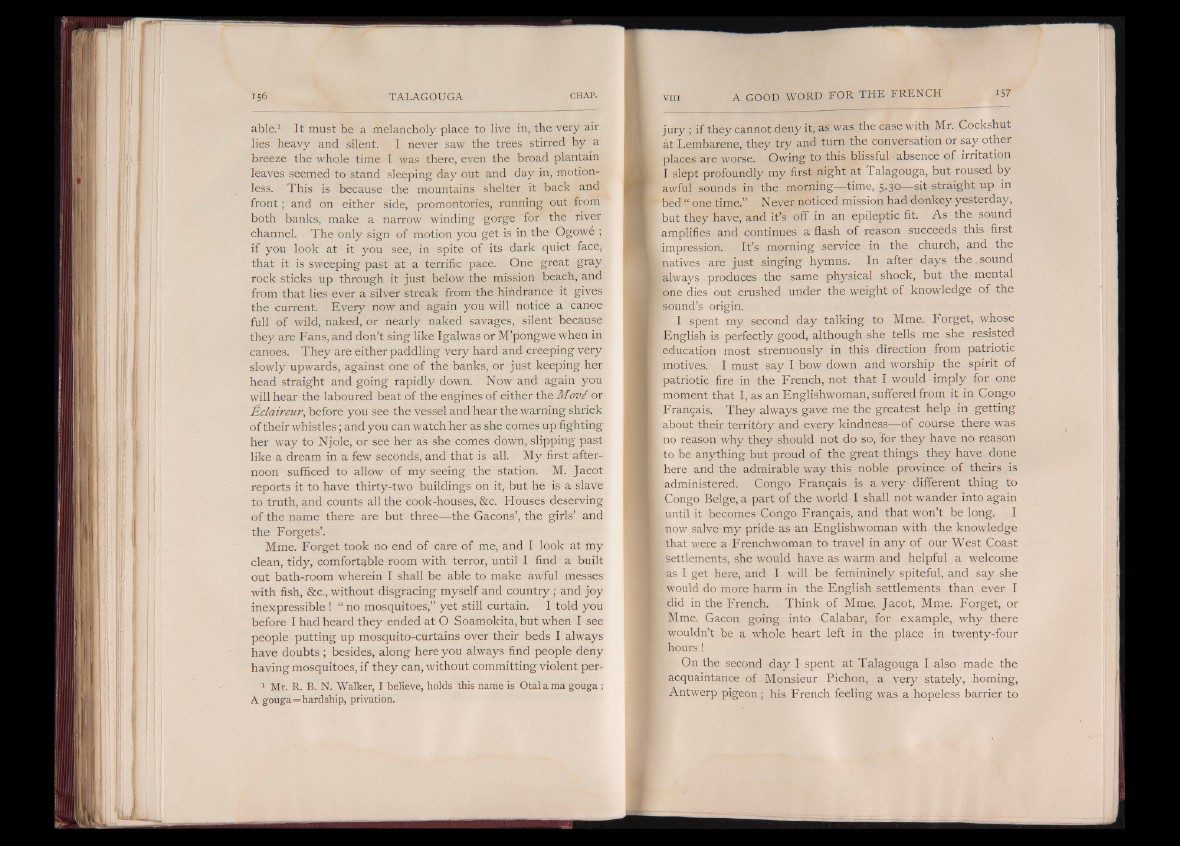
able.1 It must be a melancholy place to live in, the very air
lies heavy and silent. I never saw the trees stirred by a
breeze the whole time I was there, even the broad plantain
leaves seemed to stand sleeping day out and day in, motionless.
This is because the mountains shelter it back and
front ; and on either side, promontories, running out from
both banks, make a narrow winding gorge for the river
channel. The only sign of motion you get is in the Ogowe ;
if you look at it you see, in spite of its dark quiet face,
that it is sweeping past at a terrific pace. One great gray
rock sticks up through it just below the mission beach, and
from that lies ever a silver streak from the hindrance it gives
the current. Every now and again you will notice a canoe
full of wild, naked, or nearly naked savages, silent because
they are Fans, and don’t sing like Igalwas or M’pongwe when in
canoes. They are either paddling very hard and creeping very
slowly upwards, against one of the banks, or just keeping her
head straight and going rapidly down. Now and again you
will hear the laboured beat of the engines of either the Mové or
Éclaireur, before you see the vessel and hear the warning shriek
of their whistles ; and you can watch her as she comes up fighting
her way to Njole, or see her as she comes down, slipping past
like a dream in a few seconds, and that is all. My first afternoon
sufficed to allow of my seeing the station. M. Jacot
reports it to have thirty-two buildings on it, but he is a slave
to truth, and counts all the cook-houses, &c. Houses deserving
of the name there are but three— the Gacons’, the girls’ and
the Forgets’.
Mme. Forget took no end of care of me, and I look at my
clean, tidy, comfortable room with terror, until I find a built
out bath-room wherein I shall be able to make awful messes
with fish, &c., without disgracing myself and country ; and joy
inexpressible ! “ no mosquitoes,” yet still curtain. I told you
before I had heard they ended at O Soamokita, but when I see
people putting up mosquito-curtains over their beds I always
have doubts ; besides, along here you always find people deny
having mosquitoes, if they can, without committing violent per-
1 Mr. R. B. N. Walker, I believe, holds this name is Otai a ma gouga ;
A gouga= hardship, privation.
jury ; if they cannot deny it, as was the case with Mr. Cockshut
àt Lembarene, they try and turn the conversation or say other
places are worse. Owing to this blissful absence of irritation
I slept profoundly my first night at Talagouga, but roused by
awful sounds in the morning— time, 5.30— sit straight up in
bed “ one time.” Never noticed mission had donkey yesterday,
but they have, and it’s off in an epileptic fit. As the sound
amplifies and continues a flash of reason succeeds this first
impression. It’s morning service in the church, and the
natives are just singing hymns. In after days the,sound
always produces the same physical shock, but the mental
one dies out crushed under the weight of knowledge of -the
sound’s origin.
I spent my second day talking to Mme. Forget, whose
English is perfectly good, although she tells me she resisted
education most strenuously in this direction from patriotic
motives. I must say I bow down and worship the spirit of
patriotic fire in the French, not that I would imply for one
moment that fj as an Englishwoman, suffered from it in Congo
Français. They always gave me the greatest help in getting
about their territbry and every kindness— of course there was
no reason why they should not do so, for they have no reason
to be anything but proud of the great things they have done
here and the admirable way this noble province of theirs is
administered. Congo Français is a very different thing to
Congo Beige, a part of the world I shall not wander into again
until it becomes Congo Français, and that won’t be long. I
now salve my pride as an Englishwoman with the knowledge
that were a Frenchwoman to travel in any of our West Coast
I Settlements, she would have as warm and helpful a welcome
i.as I get here, and I will be femininely spiteful, and say she
would do more harm in the English settlements than ever I
did in the French. Think of Mme. Jacot, Mme. Forget, or
Mme. Gacon going into Calabar, for example, why there
wouldn’t be a whole heart left in the place in twenty-four
hours !
On the second day I spent at Talagouga I also made the
acquaintance of Monsieur Pichon, a very stately, homing,
Antwerp pigeon ; his French feeling was a hopeless barrier to